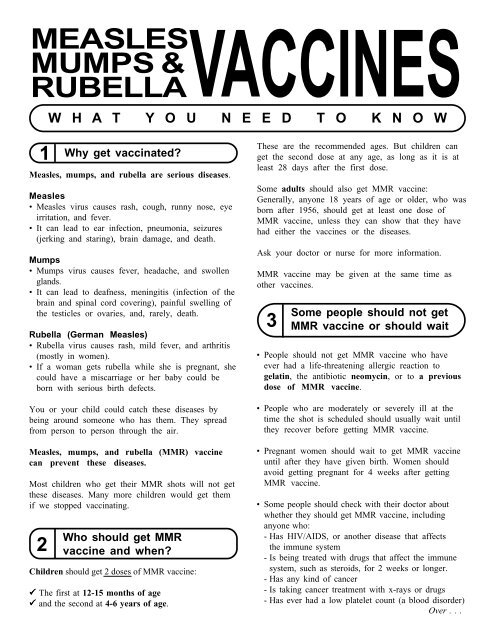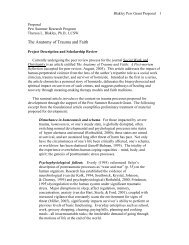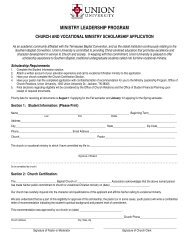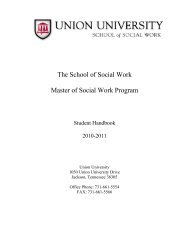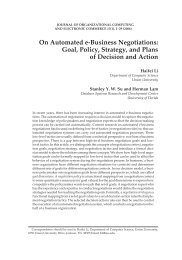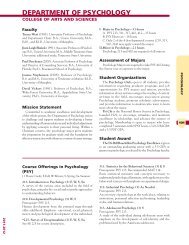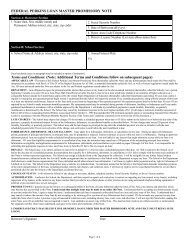MEASLES MUMPS &
MEASLES MUMPS &
MEASLES MUMPS &
Create successful ePaper yourself
Turn your PDF publications into a flip-book with our unique Google optimized e-Paper software.
<strong>MEASLES</strong><br />
RUBELLAVACCINES<br />
<strong>MUMPS</strong> &<br />
W H A T Y O U N E E D T O K N O W<br />
1<br />
Measles, mumps, and rubella are serious diseases.<br />
Measles<br />
• Measles virus causes rash, cough, runny nose, eye<br />
irritation, and fever.<br />
• It can lead to ear infection, pneumonia, seizures<br />
(jerking and staring), brain damage, and death.<br />
Mumps<br />
• Mumps virus causes fever, headache, and swollen<br />
glands.<br />
• It can lead to deafness, meningitis (infection of the<br />
brain and spinal cord covering), painful swelling of<br />
the testicles or ovaries, and, rarely, death.<br />
Rubella (German Measles)<br />
• Rubella virus causes rash, mild fever, and arthritis<br />
(mostly in women).<br />
• If a woman gets rubella while she is pregnant, she<br />
could have a miscarriage or her baby could be<br />
born with serious birth defects.<br />
You or your child could catch these diseases by<br />
being around someone who has them. They spread<br />
from person to person through the air.<br />
Measles, mumps, and rubella (MMR) vaccine<br />
can prevent these diseases.<br />
Most children who get their MMR shots will not get<br />
these diseases. Many more children would get them<br />
if we stopped vaccinating.<br />
2<br />
Why get vaccinated<br />
Who should get MMR<br />
vaccine and when<br />
Children should get 2 doses of MMR vaccine:<br />
The first at 12-15 months of age<br />
and the second at 4-6 years of age.<br />
These are the recommended ages. But children can<br />
get the second dose at any age, as long as it is at<br />
least 28 days after the first dose.<br />
Some adults should also get MMR vaccine:<br />
Generally, anyone 18 years of age or older, who was<br />
born after 1956, should get at least one dose of<br />
MMR vaccine, unless they can show that they have<br />
had either the vaccines or the diseases.<br />
Ask your doctor or nurse for more information.<br />
MMR vaccine may be given at the same time as<br />
other vaccines.<br />
3<br />
Some people should not get<br />
MMR vaccine or should wait<br />
• People should not get MMR vaccine who have<br />
ever had a life-threatening allergic reaction to<br />
gelatin, the antibiotic neomycin, or to a previous<br />
dose of MMR vaccine.<br />
• People who are moderately or severely ill at the<br />
time the shot is scheduled should usually wait until<br />
they recover before getting MMR vaccine.<br />
• Pregnant women should wait to get MMR vaccine<br />
until after they have given birth. Women should<br />
avoid getting pregnant for 4 weeks after getting<br />
MMR vaccine.<br />
• Some people should check with their doctor about<br />
whether they should get MMR vaccine, including<br />
anyone who:<br />
- Has HIV/AIDS, or another disease that affects<br />
the immune system<br />
- Is being treated with drugs that affect the immune<br />
system, such as steroids, for 2 weeks or longer.<br />
- Has any kind of cancer<br />
- Is taking cancer treatment with x-rays or drugs<br />
- Has ever had a low platelet count (a blood disorder)<br />
Over . . .
• People who recently had a transfusion or were<br />
given other blood products should ask their doctor<br />
when they may get MMR vaccine<br />
Ask your doctor or nurse for more information.<br />
4<br />
What are the risks from<br />
MMR vaccine<br />
A vaccine, like any medicine, is capable of causing<br />
serious problems, such as severe allergic reactions.<br />
The risk of MMR vaccine causing serious harm, or<br />
death, is extremely small.<br />
Getting MMR vaccine is much safer than getting<br />
any of these three diseases.<br />
Most people who get MMR vaccine do not have<br />
any problems with it.<br />
Mild Problems<br />
• Fever (up to 1 person out of 6)<br />
• Mild rash (about 1 person out of 20)<br />
• Swelling of glands in the cheeks or neck (rare)<br />
If these problems occur, it is usually within 7-12 days after<br />
the shot. They occur less often after the second dose.<br />
Moderate Problems<br />
• Seizure (jerking or staring) caused by fever (about<br />
1 out of 3,000 doses)<br />
• Temporary pain and stiffness in the joints, mostly<br />
in teenage or adult women (up to 1 out of 4)<br />
• Temporary low platelet count, which can cause a<br />
bleeding disorder (about 1 out of 30,000 doses)<br />
Severe Problems (Very Rare)<br />
• Serious allergic reaction (less than 1 out of a million<br />
doses)<br />
• Several other severe problems have been known to<br />
occur after a child gets MMR vaccine. But this<br />
happens so rarely, experts cannot be sure whether<br />
they are caused by the vaccine or not. These include:<br />
- Deafness<br />
- Long-term seizures, coma, or lowered consciousness<br />
- Permanent brain damage<br />
serious allergic reaction include difficulty breathing,<br />
hoarseness or wheezing, hives, paleness, weakness, a<br />
fast heart beat or dizziness within a few minutes to<br />
a few hours after the shot. A high fever or seizure,<br />
if it occurs, would happen 1 or 2 weeks after the<br />
shot.<br />
What should I do<br />
• Call a doctor, or get the person to a doctor right<br />
away.<br />
• Tell your doctor what happened, the date and time it<br />
happened, and when the vaccination was given.<br />
• Ask your doctor, nurse, or health department to<br />
report the reaction by filing a Vaccine Adverse<br />
Event Reporting System (VAERS) form.<br />
Or you can file this report through the VAERS<br />
web site at www.vaers.org, or by calling<br />
1-800-822-7967.<br />
VAERS does not provide medical advice.<br />
6<br />
In the rare event that you or your child has a<br />
serious reaction to a vaccine, a federal program has<br />
been created to help you pay for the care of those<br />
who have been harmed.<br />
For details about the National Vaccine Injury<br />
Compensation Program, call 1-800-338-2382 or visit<br />
the program’s website at www.hrsa.gov/osp/vicp<br />
7<br />
The National Vaccine Injury<br />
Compensation Program<br />
How can I learn more<br />
• Ask your doctor or nurse. They can give you the<br />
vaccine package insert or suggest other sources of<br />
information.<br />
• Call your local or state health department’s<br />
immunization program.<br />
• Contact the Centers for Disease Control and Prevention<br />
(CDC):<br />
- Call 1-800-232-4636 (1-800-CDC-INFO)<br />
- Visit the National Immunization Program’s website at<br />
www.cdc.gov/nip<br />
5<br />
What if there is a moderate<br />
or severe reaction<br />
What should I look for<br />
Any unusual conditions, such as a serious allergic<br />
reaction, high fever or behavior changes. Signs of a<br />
U.S. DEPARTMENT OF HEALTH & HUMAN SERVICES<br />
Centers for Disease Control and Prevention<br />
National Immunization Program<br />
Vaccine Information Statement<br />
MMR (1/15/03)<br />
42 U.S.C. § 300aa-26


